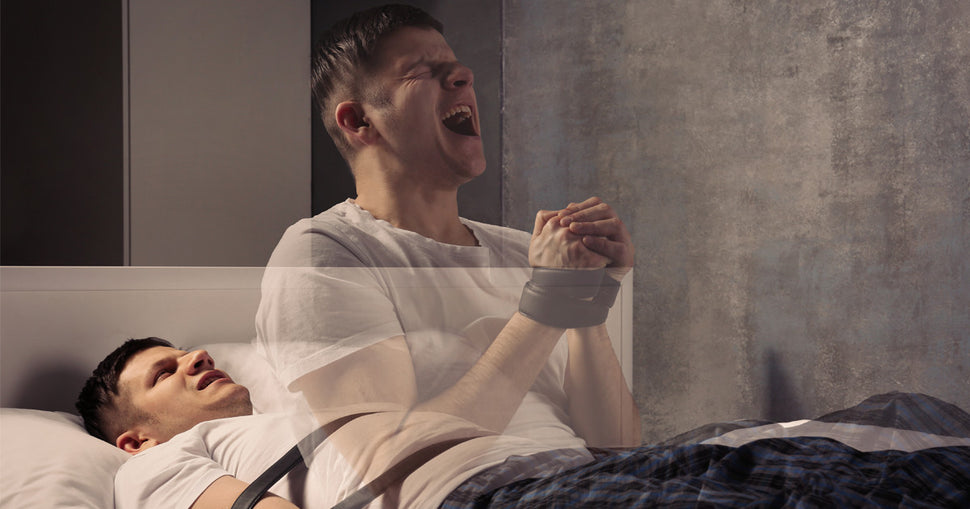What is sleep paralysis?
09 Aug 2021
Have you ever had that terrifying experience where you feel like you’ve turned into a statue in the middle of the night, unable to move or speak? You’re not the only one. It’s a fairly common phenomenon called sleep paralysis and we’re here to help you understand this disorder a little better.
What is sleep paralysis?
When you sleep, you’re body goes through two different stages – Non-Rapid Eye Movement (NREM) sleep and Rapid Eye Movement (REM) sleep. NREM sleep occurs first and constitutes about 75 – 80% of your sleep duration (1). In this stage your brain activity slows down, your muscles relax, and you slowly drift off into deep slip. When you shift to the REM stage, your heart rate and breathing becomes faster while dreams occur, even though your body is still relaxed.
During the REM stage it’s possible to enter into a state of “mixed consciousness” (2) where you’re partly awake and partly asleep, and you then become conscious of your muscles’ relaxed state. This makes you feel paralysed or like you cannot move, hence the term sleep paralysis.
Causes of Sleep Paralysis
The definite causes of sleep paralysis are still unknown. However, sleep disorders, as well as mental conditions, are known contribute to its symptoms.
- Insomnia: If you’re having trouble either falling or staying asleep, your likelihood of waking up during the REM stage and experiencing paralysis is much higher.(3)
- Disrupted sleeping patterns: If you work night shifts you travel to countries in different time zones often, you’re more likely to experience sleep paralysis because of the poor quality of your sleep. Constant stress can also disrupt your sleep patterns.
- Narcolepsy: Narcolepsy is also one of the causes of sleep paralysis. It is a rare sleep disorder in which you fall asleep frequently during the day, even when you’re in the middle of an activity, like talking, eating or driving. This sleep disorder affects the brain’s sleep-wake cycle and increases one’s chances of experiencing sleep paralysis. (4)
- Post-traumatic stress disorder: Post-traumatic stress disorder (PTSD) is an anxiety disorder that is caused by very stressful, frightening or distressing events. People suffering from PTSD recount stressful events during their sleep, which can also lead to sleep paralysis.
- Family history: Sleep paralysis can be hereditary and is likely to be experienced by people who have a family history of this condition. (5)
Signs and Symptoms of Sleep Paralysis
Sleep paralysis is a scary experience and can leave you feeling very stressed and even fearful of falling asleep again, even though the symptoms of this condition last for only a few seconds to minutes. These include an inability to speak, shout, scream or move. Others may experience feelings of fear along with hallucinations. You might also feel like someone is sitting on your chest, making it hard for you to breathe—spooky!
What are hallucinations?
Hallucinations are experiences that you perceive as real even though our not. As symptoms of sleep paralysis, they can be classified into 3 types:
- Intruder hallucinations: A hallucination where you sense a threatening or malicious presence. You may witness a shadowy figure of a person or feel like your partner is laughing at you.
- Incubus hallucinations: Here you feel as if something is pressing down upon your chest or trying to choke you.
- Vestibular-motor hallucinations: You may feel like you are having an out-of-the-body experience, where you feel like your floating and can see yourself lying in bed.
All these types of sleep paralysis can last from a few seconds to around 20 minutes. The average length of every episode is between six and seven minutes. (6)
Sleep paralysis treatments
There is no one specific treatment for sleep paralysis. However, things like maintaining a regular sleep schedule, and observing good sleep habits can reduce the occurrence of this disorder. Other sleep paralysis treatments include:
- Addressing mental health disorders: If you have depression, anxiety or other types of mental illnesses that lead to disturbed sleep, you might want to see a medical practitioner to treat your illness. This can help you sleep better, reducing your chances of experiencing sleep paralysis.
- Combating stress: Stress plays havoc with your sleep-wake cycle. It also effects your body in other ways. Practicing yoga, breathing exercises like pranayama (a yogic practice of focusing on the breath), going for walks, taking a hot bath, and listening to soothing music can help you relax and unwind.
- Sleep supplements: Melatonin is a hormone that induces sleep. When your body does not produce sufficient melatonin, you can have trouble falling and staying asleep. Setu Sleep: Restore—a natural, non-addictive melatonin supplement—can help make up for this deficiency and give your body the right amount of melatonin it needs.
Tips for better sleep
Maintaining a proper sleeping pattern is the key to preventing sleep paralysis. Ensure that you always get sufficient hours of quality sleep! Here’s how you can do this:
- Consistency is key: Keep your bedtime and wake-up time consistent, even on holidays and weekends. A circadian rhythm is the natural process that regulates the sleep–wake cycle of your body. It functions on a set loop in repeat, aligning itself with sunrise and sunset. When you don’t sleep on time, this loop gets thrown off balance, disrupting your sleep quality.
- Get comfortable: Create a comfortable sleep environment for yourself. Use suitable bedding and sleepwear and make sure that your room is clean, dark and cool.
- Ditch the afternoon siesta: Napping during the late afternoon or evening will affect your nigh-time sleep quality, given that you may already feel rested.
- Stay away alcohol and caffeine: Avoid consuming alcohol and caffeine before bedtime. They both stimulate your nervous system and stop your body from relaxing naturally at night.
- Create night rituals: Make sure to develop some healthy night rituals like deep breathing, reading a book (on paper, not a screen) and listening to light soothing music. Rituals calm your mind and help you fall asleep faster.
- Avoid gadgets before bed: Strictly avoid gadgets two hours before bedtime. Blue light, the light that emanates from your phone or laptop screen, reduces melatonin secretion and makes it hard for you to fall asleep.
FAQs
1) When should I see a doctor to treat sleep paralysis?
If you face repeated symptoms of sleep paralysis consult a doctor. Additionally, if you are very anxious or scared to go to sleep due to an instance sleep paralysis, or if you are tired all the time due to lack of sleep, please seek medical attention as soon as you can.
2) How is sleep paralysis diagnosed?
Your doctor may carry out a sleep study on you. Tests will be conducted to record your brain waves, heart rate and breathing as you sleep. Your doctor may also ask you to maintain a sleep diary and record occurrences of sleep paralysis alongside any other sleep issues.
Skin: Renew - Glutathione - Orange Flavour
- ₹1,944
- ₹1,944
-
₹2,800 -
You Save:
₹856 (30%)
Categories
- Choosing a selection results in a full page refresh.
- Press the space key then arrow keys to make a selection.
this is the sidecart










